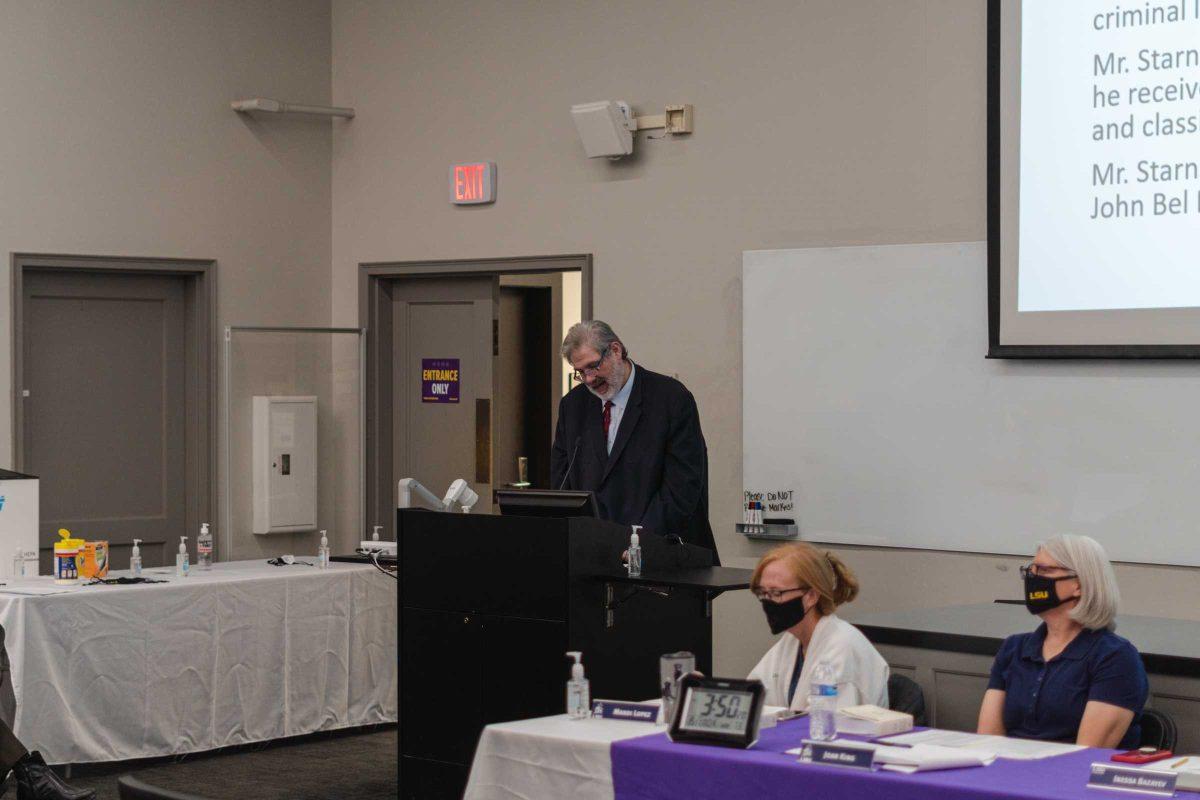An oil company president, a handful of CEOs and business people, a chairwoman of a firearms distributor, a few lawyers—and not an educator among them. It’s not exactly the makeup you’d expect from the board that governs our university.
As established in the Louisiana constitution, the LSU Board of Supervisors is comprised of 16 members appointed by the governor and approved by the Louisiana Senate for staggered, six-year terms, alongside one student representative who serves a one-year term.
Its stated purpose is to “supervise and manage the institutions, statewide agricultural programs, and other programs administered through its system.” Yet, not a single one of the Board members comes from academia, which seems odd considering their power over an institution of higher education.
This isn’t to suggest that Board membership should be exclusively reserved for PhDs. Members with background working in education at any level should be welcome—and expected—on the Board.
Those with firsthand knowledge of the state of education and agriculture in Louisiana are vital assets to running what is, after all, an agricultural and mechanical university. Community organizers who have worked to improve education in Louisiana would also make excellent additions to the Board.
It is difficult to see what—outside of political favor—motivated Gov. John Bel Edwards to appoint Board members with no background at all in education, agriculture or true public service. This is certainly not to unequivocally declare every Board member unfit and poorly motivated, but rather to suggest that we should look more critically at why the governor made the appointments he did.
Can the governor say that he honestly chose the best members and experts he could to chair the Board? That all his appointments were motivated out of what was best for the university, not politics or self-interest?
Personally, I’m not convinced.
This isn’t just a problem with Edwards. For years, membership on the Board has not been taken as seriously by governors as it ought to be.
But maybe the makeup of the Board wouldn’t be so important if not for the corruption that follows it time after time.
The Board is notoriously unresponsive, and even actively hostile, to the concerns of faculty and staff.
Take the infamous election of F. King Alexander as president of the university in 2013. The process that preceded his tenure was highly secretive, eventually resulting in a lawsuit from the Advocate and then editor in chief of the Reveille Andrea Gallo. A unanimous vote of no confidence from the Faculty Senate did nothing to change the mind of Board members, who proceeded to elect Alexander despite loud protests from faculty.
Though many of the Board members have changed since then, the trend of disregarding university employees has not.
More recently, the Board appeared resentful of faculty criticism of COVID-19 protocol, going so far as to support a resolution to dissolve the Faculty Council, which was activated for the first time in years in May 2021 to vote overwhelmingly in favor of a vaccine mandate.
Though the resolution was ultimately tabled, the Board’s willingness to support it lays bare a fundamental disrespect for the wishes of faculty from the administration.
This is the same Board that eagerly pushed the narrative that all those involved in the university’s egregious Title IX failures were long gone. They embraced the paltry slaps-on-the-wrists for athletic administrators involved in grave misgivings of justice.
And during recent Title IX training, Board member Jay Blossman complained, to the agreement of others, that “you can’t even say good morning anymore,” a disappointing level of analysis from someone supposedly addressing what is a horrifying history of the university’s incompetence dealing with sexual violence.
This is, of course, not to mention that Board members with knowledge of former football coach Les Miles’ conduct failed to heed then Athletic Director Joe Alleva’s recommendation to fire him—that is, until his football record slipped.
Again, there have been changes in membership since then, though we should consider if the corrupt motivations that kept the Board from kicking out Miles have really changed. Considering the silence from the Board on head football coach Ed Orgeron’s alleged failure to report rape and sexual harassment, it seems they haven’t.
As a student, the Board’s leadership does not inspire confidence in the university, and neither does the process by which many of them were appointed.
The Board sometimes feels like a disconnected part of the university, one which students often ignore, yet its members are worthy of our attention and critical eye. After all, the Board is meant to serve the university.
It’s time we ask more of that service.
Claire Sullivan is a 19-year-old coastal environmental science student from Southbury, CT.






